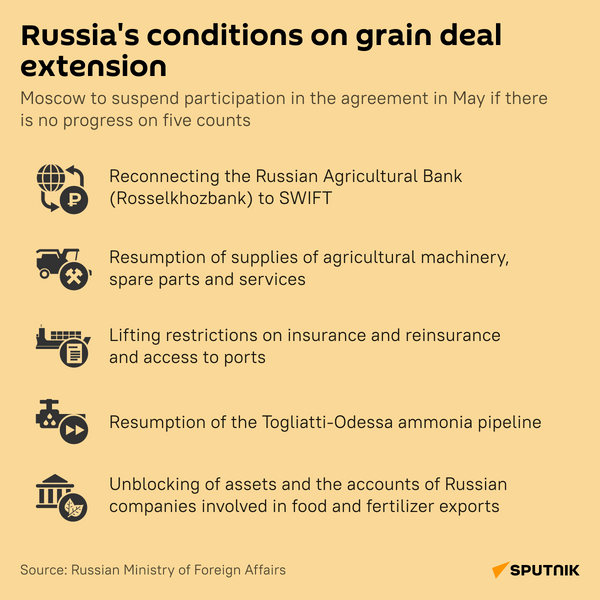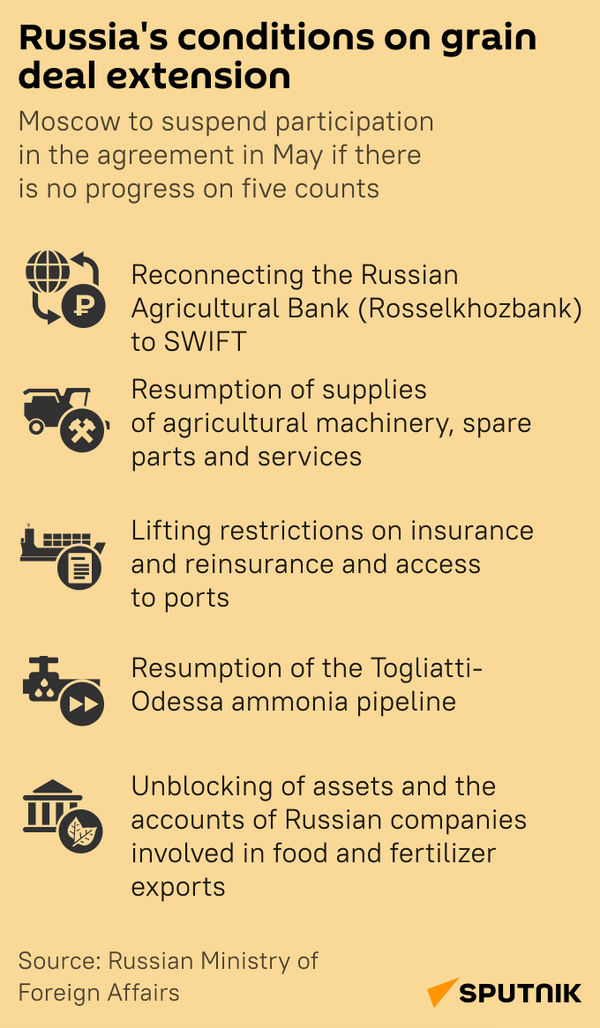https://sputnikglobe.com/20230511/russia-sees-no-point-in-preserving-black-sea-grain-deal-against-its-interests-1110268819.html
Russia Sees No Point in Preserving Black Sea Grain Deal Against Its Interests
Russia Sees No Point in Preserving Black Sea Grain Deal Against Its Interests
Sputnik International
Russian Deputy Foreign Minister Sergey Vershinin warned that there is no reason for Moscow to participate in initiatives such as the so-called “Black Sea Grain Deal” if the part of the deal beneficial to Russia is not implemented.
2023-05-11T17:55+0000
2023-05-11T17:55+0000
2023-05-11T17:56+0000
world
grain exports
ukraine
russia
deal
https://cdn1.img.sputnikglobe.com/img/07e6/09/0a/1100633252_0:159:3078:1890_1920x0_80_0_0_9a6221e13ee15486cd0dfc78f8f64a01.jpg
Russian Deputy Foreign Minister Sergey Vershinin warned that there is simply no reason for Moscow to participate in initiatives such as the so-called “Black Sea Grain Deal” if the part of the deal that is beneficial to Russia is not implemented.He also pointed out that, despite the fact that the deal was essentially meant to help poor countries, over 40 percent of the grain exported under the auspices of this deal has ended up in countries with “high, medium income level” while only 2.6 percent of grain going to “the poorest countries who actually face real problems.”Brokered with the help of Turkiye in July 2022, the deal was meant to create a framework for exporting Ukrainian grain via the Black Sea ports in order to help stave off the threat of famine in countries dependent on food shipments from abroad.Under the auspices of the deal, a number of economic restrictions imposed by the West upon Russia over the Ukrainian conflict were supposed to be removed in order to facilitate the export of agricultural products from Russia as well as to further improve the food security situation in the world.However, while the deal’s provisions beneficial to the Western and Ukrainian interests were implemented in full, the aforementioned anti-Russian economic restrictions remained in place, thus making Moscow increasingly reluctant to renew the deal as the deadline draws near.In exchange for extending the deal beyond May 18, Russia seeks, among other things, the reconnection to SWIFT of the Russian Agricultural Bank (Rosselkhozbank) and the unblocking of the assets and accounts belonging to Russian companies involved in the exports of food and fertilizers.Moscow also seeks to resume the flow of ammonia – a vital element of fertilizer production – along the Togliatti-Odessa pipeline, which is currently blocked by the Ukrainian side.If these conditions are not met, Russia sees no point in the continuation of the “grain deal” as that agreement would then benefit the West and Ukraine, but not Russia itself.
1
ukraine
russia
Sputnik International
feedback@sputniknews.com
+74956456601
MIA „Rossiya Segodnya“
2023
News
en_EN
Sputnik International
feedback@sputniknews.com
+74956456601
MIA „Rossiya Segodnya“
Sputnik International
feedback@sputniknews.com
+74956456601
MIA „Rossiya Segodnya“
black sea grain initiative, black sea grain deal
black sea grain initiative, black sea grain deal
Russia Sees No Point in Preserving Black Sea Grain Deal Against Its Interests
17:55 GMT 11.05.2023 (Updated: 17:56 GMT 11.05.2023) On May 18, an international agreement known as the Black Sea Grain Initiative or Deal may fall through unless renewed.
Russian Deputy Foreign Minister Sergey Vershinin warned that there is simply no reason for Moscow to participate in initiatives such as the so-called “Black Sea Grain Deal” if the part of the deal that is beneficial to Russia is not implemented.
He also pointed out that, despite the fact that the deal was essentially meant to help poor countries, over 40 percent of the grain exported under the auspices of this deal has ended up in countries with “high, medium income level” while only 2.6 percent of grain going to “the poorest countries who actually face real problems.”
Brokered with the help of Turkiye in July 2022, the deal was meant to create a framework for exporting Ukrainian grain via the Black Sea ports in order to help stave off the threat of famine in countries dependent on food shipments from abroad.
Under the auspices of the deal, a number of economic restrictions imposed by the West upon Russia over the Ukrainian conflict were supposed to be removed in order to facilitate the export of agricultural products from Russia as well as to further improve the food security situation in the world.
However, while the deal’s provisions beneficial to the Western and Ukrainian interests were implemented in full, the aforementioned anti-Russian economic restrictions remained in place, thus making Moscow increasingly reluctant to renew the deal as the deadline draws near.
In exchange for extending the deal beyond May 18, Russia seeks, among other things, the reconnection to SWIFT of the Russian Agricultural Bank (Rosselkhozbank) and the unblocking of the assets and accounts belonging to Russian companies involved in the exports of food and fertilizers.
Moscow also seeks to resume the flow of ammonia – a vital element of fertilizer production – along the Togliatti-Odessa pipeline, which is currently blocked by the Ukrainian side.
If these conditions are not met, Russia sees no point in the continuation of the “grain deal” as that agreement would then benefit the West and Ukraine, but not Russia itself.



